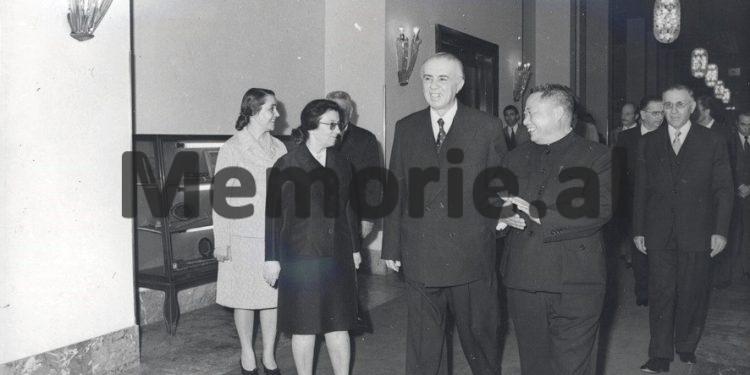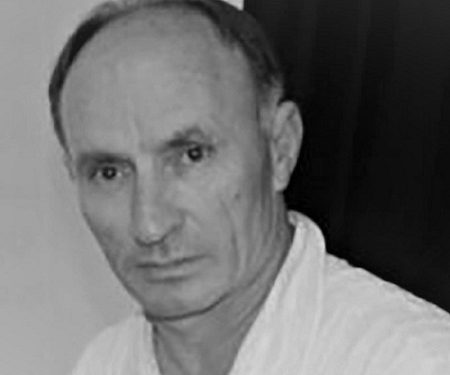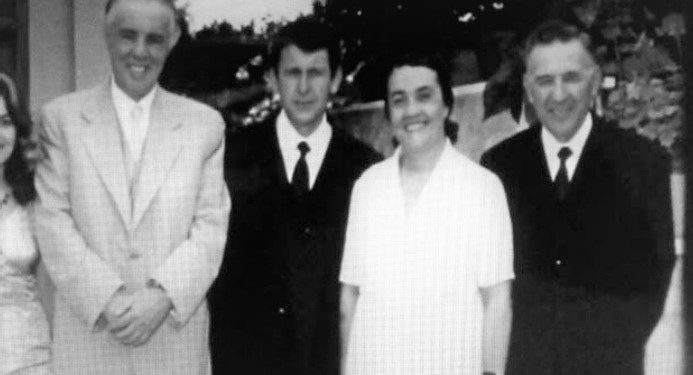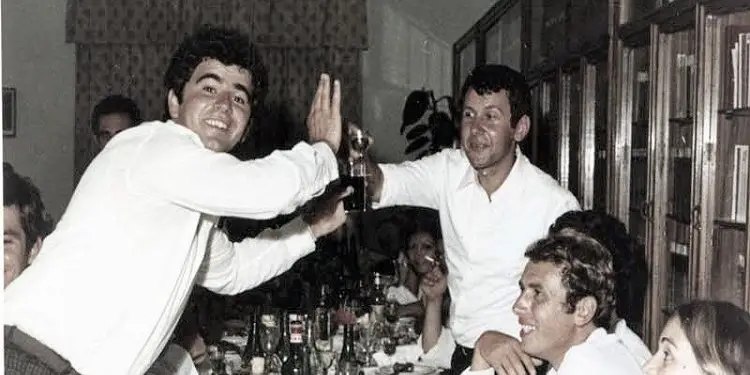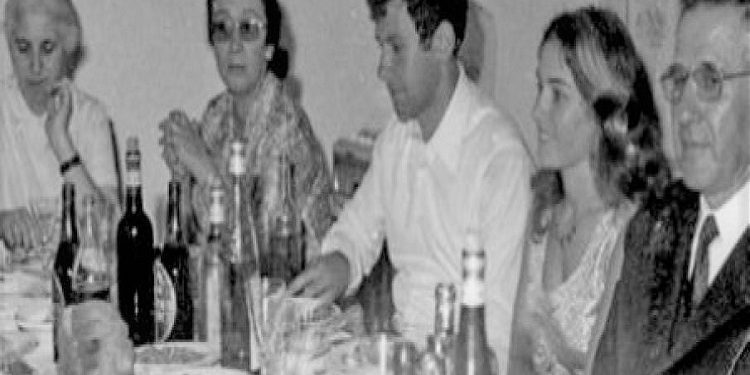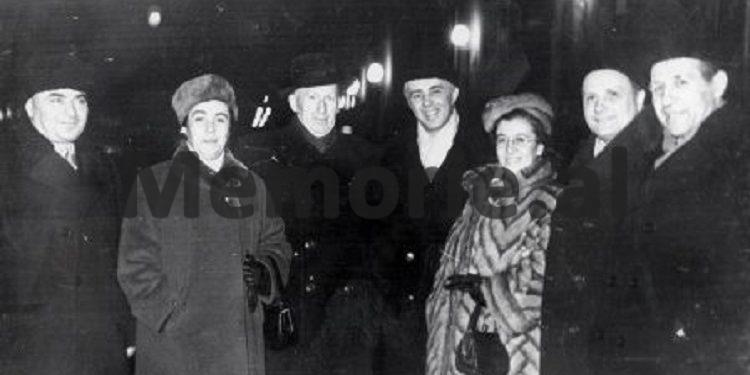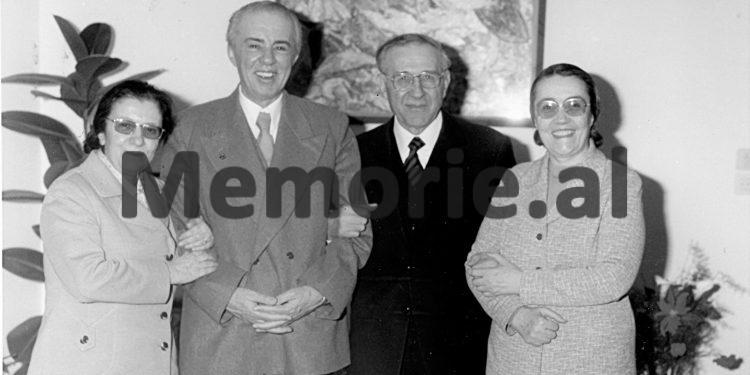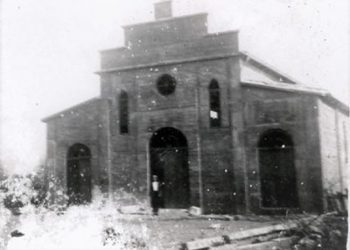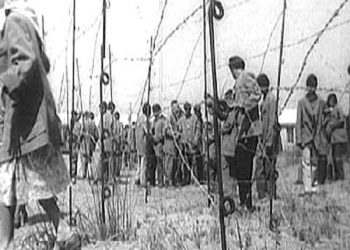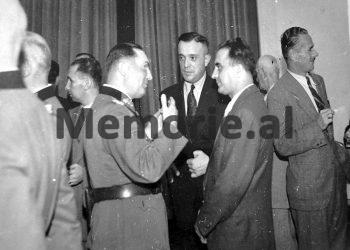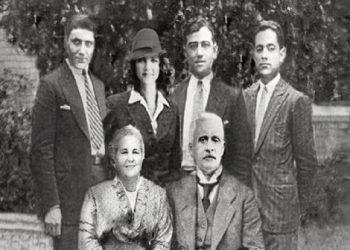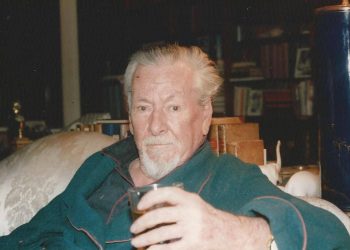From Xhevahir Gradica
Memorie.al / One of the figures that has aroused quite a bit of curiosity in Durres is that of the son of the former Albanian Prime Minister Mehmet Shehu, who served as an engineer and chief engineer at the Radio-Television Factory in the city of Durres. Vladimir Shehu, for his peers and the people who worked with him, is said to have led a bohemian life, neither falling under the slavery of his father’s political authority nor on the other path, filled with anti-communists. His position has been that of a humane citizen and a very passionate specialist, who has always appreciated the work and conscience of others. Although he came from a very privileged family of the communist regime, Vladimir Shehu, according to the testimonies of his colleagues, did not use this “wealth” even once. He served at the URT of Durrës, first as a simple electrotechnical engineer, then as head of the Technical Bureau and chief engineer for the period 1971 – 1979.
This is also the period that he created friendship and recognition in this coastal city, leaving in the memory of many of them special episodes and events. His former colleague, Eng. Bashkim Kopliku, with whom he had a personal friendship as well as a working relationship, once tried to knock on the conscience of the associations and institutions of Durrës, to appreciate the work of Vladimir Shehu, separated from the fact that he was the son of the dictator Mehmet Shehu. Others remember that Vladimir Shehu, (Ladi-as he is also known in Durrës), was a dissident and that the table where he drank coffee was often under surveillance.
Communist regime
When the arrest and punishment of Beqir Balluk happened, in the Radio-Television Factory in the city of Durrës and in all the enterprises and institutions of the district, just like everywhere in the country, the political punishment, the fierce class war began. Vladimir Shehu at that time, the son of Prime Minister Mehmet Shehu, made many interventions to prevent the company’s employees from being arrested without any reason.
Such findings come from people who have worked and lived in the same technical collective with Ladi, as well as have closely known his human life. At that time Ladi was an engineer with a lot of social power. He lived the life of a simple citizen, sat in a café and talked with anyone, without dividing them into: people of the party or against the party even though he was the son of the prime minister of the country.
Everyone at that time was on edge and no one knew who would suffer first and who would be the second, but not even Ladi (Vladimir) knew about such things. in 1974 the dictator Enver Hoxha had decided to hit a major political figure and at that time there were rumors that either Beqir Balluku or Mehmet Shehu would be sacrificed in the name of the class war and the “internal enemy within the ranks of the Party”. Ladi was transferred in 1979, from the URT of Durrës, to Tirana, while he maintained his ties with former citizens and employees until his death.
It often happened that, when someone from Durrës went to Tirana, to ask for help as a very good specialist that he was, Ladi would leave all work, leave the meetings and find them. Today in Durrës there are many technicians and engineers who keep indelible impressions of very sincere relationships. With the engineer Lad Shehu, the son of former Prime Minister Mehmet Shehu, whose name would become the object of the most savage and barbaric blows of the communist regime, just two years after Lad moved to Tirana.
Vladimiri came to Durrës as a simple engineer, without any kind of post, and a few years later, he became head of the Technical Bureau at URT, chief engineer, to be transferred to Tirana, to the Electronics Center. In Tirana, the director was Sokol Hoxha, Enver Hoxha’s son. Colleagues of the son of former Prime Minister Shehu, show that; Ladi was very talented; specialists began to turn their eyes and follow his advice.
This made the son of the head of state jealous at the time and according to some associates of engineer Lad Shehu, one of the reasons why Prime Minister Mehmet Shehu was eliminated was this, as the dictator’s son did not want anyone else, even the son of Prime Minister Shehu , to be better than him. Sokol went to the Central Post, as a director, and this did not pass without consequences. The people, who knew him closely, show that Ladi Shehu had the ability and preparation to be praised.
He managed to copy “Ford” through the use of foreign literature. He did this in cooperation with Esat Fera, Bashkim Koplik, and other skilled engineers of URT, but here, the merit of the prime minister’s son was undisputed, due to the fact that he dared to insist, to take this important step. In its beginnings, the URT was near the building of the Party Committee, somewhere in the center of Durrës, and then it was transferred.
The work, experience and projects of this group of engineers, among them Lad Shehu, had an impact on this expansion. Many say that the URT was separated from the UEM (Electro-Mechanical Plant) only because of the efforts and direct influence of Vladimir Shehu. The first meeting, according to witnesses, failed. The prime minister at the time, Mehmet Shehu, was in France for eye treatment and the meeting was led by his deputy, Adil Çarçani. With a majority of votes, the request for separation was rejected.
When Mehmet Shehu returned from the cure in Paris, things spoke on the side of the specialists and the group of engineers who persistently sought the separation. This is how the new plant was started and built, which, after a few years, had about 1,200-1,300 employees, including the administration. Ladi and the engineers working with him took the American “Ford” project and copied it.
This could only be done by people like Ladi, who at that time had warm arms, to seek and receive such projects from abroad. Someone else would not dare to do it, because the punishment would be extremely serious. This social category of the dome of the state and the politics of the time had the opportunity to buy televisions and other electronic equipment abroad by order, justifying it for family use.
Then many of them, like Ladi, had foreign literature at home and studied it, unhindered by the regime or political persecution. This category had full knowledge of what was happening in the world, while for others, isolation was great and trying to find a literature of the time in the framework of innovative work would be suicide.
At this time, URT produced very little radio, while, with the creation of the technological core with engineers and specialists, including Lad Shehu, everything started to take on new colors. This is how the production of televisions began. Radios, televisions, tape recorders, cassette recorders, calculators, etc. were produced. Production increased significantly. In a short time, URT managed to produce up to 10,000 televisions per year, a figure unimaginable until that period.
TVs “Iliria”, “Adriatik”, “Dajti”, “Super-ambassador” and hand-held and home radios, such as “Iliria”, “Fatosi”, “Mimoza”, “25-vjetori”, “Drita”, etc. ., spread everywhere, as the plant produced for the whole of Albania. Parts were generally sourced in the former Yugoslavian city of Nis, a large industrial area, and the largest in the Balkans by Western standards.
Nishi had a contract with “PHILIPS” receiving the schemes, projects and everything, of course not that production line of that year, but two or three years ago, that is, when “PHILIPS” left a scheme, it switched to a scheme of more advanced cloud. At that time, the debate revolved around whether the televisions would be produced with the projects that the URT engineers had, or if they would be copied. The debate and discussions continued for a long time and in the end the idea of Vladimir Shehu and Bashkim Koplik won.
URT did not have such a Technical Bureau to experiment, and to do such a thing, large funds would be required, in incalculable amounts. Such a request would be not only useless, but also dangerous, so it was decided to copy it. With such engineers exercising their responsibilities and knowledge at the URT in Durrës, the students of the University of Tirana (Electrical Engineering branch) defended their diplomas.
So the URT, in a certain way, was also transformed into a university subsidiary. Colleagues of Eng. Vladimir Shehu, show that he was active and alive everywhere, but also calm and very sober. He was not a fanatic of the regime, even his tendency was towards liberalization. This was noticed in many cases and discussions, where he participated. The set of channels of the TV sets came with all UHF, and with them it was possible to catch channels of Western countries. The latter was removed from the warehouse.
It was a separate control laboratory for imported goods and everything was done there. The channel groups were removed and stored. With the authorization of the director of the URT, and the approval of the district Party Committee, to see the progress of the manufactured televisions, they were given to some people who were known as political confidants of the regime of that time.
This was done to see how the quality of the televisions produced in Durrës was going. The beneficiaries of this category had the whole group at home and gave opinions about the quality of the TV, the clarity of the picture, sound, channels, etc. As a rule, the group had to be submitted after 6 or 8 months, but in reality, with some small exceptions, no one submitted it.
Only for this, the director of URT was put in prison. Ladi made the main contribution to set up URT, a study center and a modern electronics manufacturing plant. Engineers and technicians in it and under the full influence of Vladimir Shehu’s professional authority, began not only to assemble considerable quantities of radios and televisions, but also many parts and electronic equipment. URT engineers also managed to produce “Blaunkt Punkt” color televisions, which was a German technology and this, according to specialists, was due to collegial thinking, while the initiative was Ladi’s.
The dissent of Lad Shehu…!
Ladi Shehu was really a dissident. According to those who had a close friendship with him, it is said that he did not like some of the political actions that Enver Hoxha did, nor did his father, Mehmet Shehu. Being a very humane man, Ladi expressed that in his social circles and this was opposition to the regime, he could not pass it so easily. Ladi lived in Durrës with his small family, in a building near the Music School, the building in which other families with influential people of that time were settled.
Unlike many children and relatives of people who had a lot of power at that time, Ladi lived simply; he liked to drink coffee in bars frequented by colleagues and ordinary people. This kept him out of sight to look for the pinyin “model” of a family of the highest nomenclature, as he actually was. Even today, many of Ladi’s peers remember him, very passionate about the “JAVA” motorcycle, which he drove very well, attracting the attention of others, the only thing that differentiated him from the youth of others.
The way he behaved and spoke made some colleagues get closer to him. They too had some silent dissent, but not against communism. At the same time that Lad Shehu was working in Durrës, in the district prosecutor’s office, there was also Spartak Ngjela, a dissident for the time but, like many intellectuals, he liked left-wing philosophers, a Nobel laureate.
Their contemporaries say that even Ngjela was not against communism, but was against the kind of communism that was established in Albania and only later, many years’ later, embraced right-wing philosophers. Lad Shehu’s social environment was generally educated and some of them started to frequent coffee with Lad more and speak with their codes, with which they could easily understand each other. Such a thing was not done to create groups and conspiracies, but only to express their opinions about the communist regime in power and the outside world that surrounded us.
All of them were sons and daughters of communist families and did not think of talking about overthrowing the system. They wanted the communist regime in power to fix the injustices and the current situation in the country. This request stemmed from their spiritual righteousness. They talked about the class of political convicts and persecuted, and Ladi, as well as others, said that the state should not take them by the neck, but make them its own.
According to his colleagues and friends, Ladi did not want to know if someone was the son, brother, nephew, uncle of so-and-so convicted or shot. But he did not even come from a family with a very good political composition of that system. He hung out with everyone, but spoke only to a small group and in codes when it came to the regime. It’s not that he used the codes out of fear, but he didn’t want their conversations to become the subject of discussion that would then cause trouble in his father’s family, with whom it was said that he didn’t get along.
Ladi spoke openly and defended those employees who did the work, not looking and not being at all interested in the biography. There have been many cases that he has intervened to give houses to those people who, for political reasons, were not given housing by the Party Committee. Ladi insisted in the company and in the Party Committee to give them shelter and authorization for a house, as a right that they earn with work and with a regular and good human attitude.
He expressed these actions in the cases when party meetings were held in the company and when the letters came to make the lists to give houses to the homeless. He did not prejudge people, he only wanted the work and this made the company give very good results. Engineer Ladi was on the side of those who were with the Party and on the other hand, he protected this layer, not all of them, only those who worked and who were unfairly considered undesirable for the regime of that time.
Ladi defended them saying that; they are very regular at work and no one has heard them speak against the state. He used these two weapons a lot and did a lot of honor to people. It is this group that, in their conversations, claimed that people who are against the idea that the communists would convince this category with their work should also be accepted. However, they did not call obedience by violence, imprisonment, exile and other inhumane methods justified.
In the 50s, very few radios and so many televisions had entered Albania that they could be counted on the fingers of the hand. People who knew Ladi closely say that he told them that until the end of the 50s, neither Enver Hoxha nor Mehmet Shehu had televisions in their homes. The first television in Albania was produced in the early 70s, and the thirst and hunger for them and for radio was very great.
After the 70s and with the start of mass production of televisions in Durrës, the situation began to change, but they still continued to be obtained with authorization. Until the years 1973-’74, it was enough to install the antenna and the Italian stations came out, a great desire, especially of the citizens of Durrës who followed sports, news, shows and various concerts overseas. This made quite an impression and brought nervousness to the top leadership and its respective party and state structures.
Seeing the great influence that foreign television and stations had (mainly Italian and Yugoslav ones, and less Greek ones in the south of the country), the communist regime in power wanted to block any information coming from abroad, while for Ladi and his group of fellow engineers, a waste of time and nerves for this, was worthless and at a great cost, since mostly young people who wanted to see the West were punished.
In this period of time, loudspeakers were placed to block television waves in the homes of citizens who had a television set, while there was no interest in the village, starting from the fact that the village did not have many televisions or radios and that the educational level of theirs was still low.
Interception by Security…!
The contemporaries of Lad Shehu show that they used to get along with each other by mimicry, implying that there was no question of talking openly. Generally, they drank coffee at “Vollga” and after sitting down; they put their hand under the table once, to see if there was anything installed, to eavesdrop. Such care, which was also shown by Ladi, even though he was the prime minister’s son, proved that Ladi understood, as well as the group, the topic and essence of the conversation they had to have.
Ladi was called several times to the Department of Internal Affairs in Durrës, where he was told several times not to hang out with this or that person, reminding him that the specific names that were being talked about were unwanted by the regime. This was enough to suspect that the State Security was eavesdropping on the table where Ladi was sitting, who did not give up the company even though the Interior Department had drawn his attention several times!
His colleagues say that; such inconsistency also came from the fact that he was the son of the strongest man in Albania, after Enver Hoxha, and that he had told this to his friends and colleagues. Vladimir Shehu had neither friends nor friends who were members of the party. Mehmet Shehu’s son, at the height of his father’s career, did not hang out or have company with even a party member.
This could not fail to be noticed, but Ladi covered the doubts of others with his simplicity. The only communist with whom Ladi lived was a wood engineer and he used this to say that; I’m living with a party man. Then he acted as if he was hanging around to show that he also had friends in the party, an action he did not to anger those in the party, or the “friends” of the Department of the Interior and State Security.
Some of his friends were: Adrian Qereshniku, (originating from Berat), whom Fiqreti had a friend and distant tribe from his mother. Adriani had his father in prison, (Ihsan Qereshniku, sentenced to political prison in 1946, as an “agent of the Anglo-Americans”), while Ladi was constantly with him. Likewise, Esat Ferra, was the son of the famous ex-lawyer of Vlora, whom Ladi was a close friend of. Bashkim Kopliku, there was no good biography for the time, because his aunt was the wife of the most powerful man during the Zog regime, but
Ladi loved and respected the Union very much; his biography did not prevent them from being together, even openly, without worrying at all. Until he went to the Electronics Center in Tirana (which later became the Electronics Institute), Ladi became friends with many people with bad biographies. It is not that the people of the party could overcome this, but Ladi, as the prime minister’s son, had nothing to do with him. But under the mat, from the beginning of 1981, the “Yllit” show for Vladimir Shehu was also coming.
It didn’t take long and the most difficult days would come for him, days that, just two years after moving from Durrës, he ends up in Gramsh, as a technician in the Repair-Services Department of the Municipal Enterprise, to end his life mysteriously. After the event of December 17-18, 1981, where Mehmet Shehut was found dead in his bedroom from a pistol bullet and his name was included in the heaviest vocabulary of Enver Hoxha and his closest collaborators him in the senior leadership of the regime in power, calling him: “enemy of the people, traitor and political agent”, Vladimir Shehu, understood his imminent end.
Unable to endure all the noise that came from politics and after the complete destruction of the life of the rest of the family and relatives, Ladi is found dead in his home in the city of Gramsh where he was sent to exile. Before he passed away, he was demoted to a simple radio technician. Although in such a job, he was not allowed to meet clients. Someone else would pick up the broken radio; Ladi would fix it and deliver it. The communist regime in power classified his death as suicide, but people who met him in the last days of his life are convinced that Vladimir Shehu was executed by the state.
For the sake of his children, Ladi asked his wife to get a divorce, as the only way to avoid punishing the family. In the memories of Vladimir Shehu’s colleagues, it is said that his wife went to Gramsh and after she returned to Tirana, the news of Ladi’s murder arrived! She was asked to speak against Ladi’s father and the State Security made every effort to use her against the former prime minister, now dead and described as an enemy and police agent.
Many of the colleagues with whom he shared thoughts and experience for nearly a decade met Ladi even in his difficult days in Tirana. But he asked them and made the firm decision not to accept any more meetings with the URT engineers, convinced that he was doing the most worthy action to not tarnish and punish them. Their meetings were being eavesdropped and one day each of them would meet a bitter end, so Ladi let them know this.
Meanwhile, they show that in the last weeks of his life, Ladi had completely fallen into pessimism and was convinced that there was no way out in front of Enver Hoxha’s regime. Always according to their statements, there were also those colleagues who went as far as to go astray for that time, asking them to go to the funeral of former Prime Minister Mehmet Shehu, even though he declared that he killed himself, which clearly meant that, he was already an enemy and he was being buried with the Municipal “Zuk” and there were only five or six people in his procession and these were from the family.
Many have considered themselves lucky to have known and worked with Vladimir Shehu. But very few, not to mention none of his colleagues, friends and colleagues, have taken the courage to come out openly, even though more than three decades have passed since the collapse of the communist regime, to speak with a proper name about the scars and the memories of his acquaintance with Vladimir Shehu, the son of the former prime minister Mehmet Shehu, who, from one of the biggest figures of that regime, was slandered, accused and denigrated, the figure most affected by Enver Hoxha and from the communist regime in power until the end of the 80s. Memorie.al




